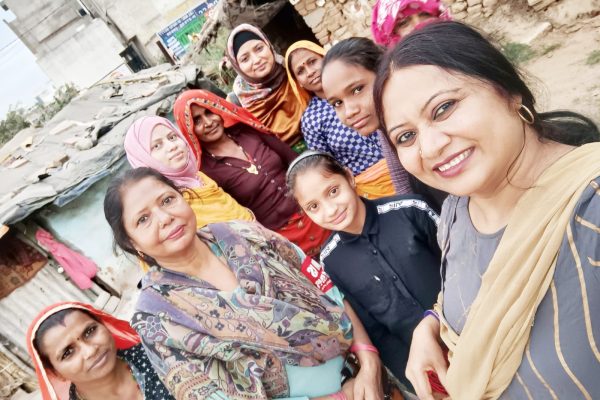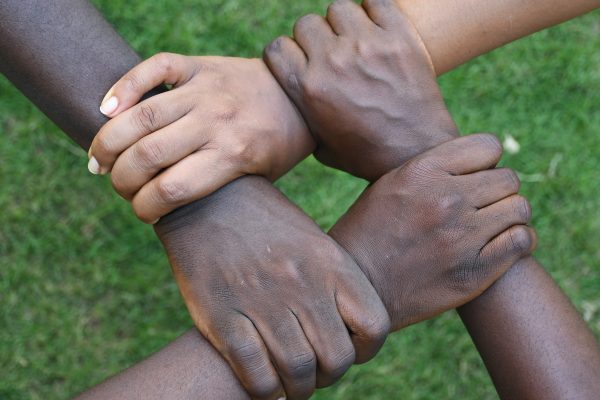If you’ve spent some time in a city, it’s likely you’ve been asked for spare change by someone on the subway, while stuck in traffic, or walking through the city centre. When I lived in New York City, this was an everyday occurrence. There comes a few seconds of awkward silence after the person asks, followed by averted gazes and a game of surveying our own shoes. The person makes their way down the length of the subway car. Within that time, a number of things will have happened. Many resume their previous conversations, pretending we cannot see or hear the asker until they disappear behind the train doors at the other end. Others silently contemplate the sincerity of their request, considering questions like: Are they telling the truth? Do they really need the money? What will they use it for: Food? Drugs?
Some, though few, of us might give a dollar, shake out three coins and drop them into their outstretched plastic cup. But we will not look them in the eye while we do it.
We make ghosts of people who ask for help.
In a Proceedings of the National Academy of Sciences (PNAS) study, researchers gave 50 individuals experiencing homelessness a one-time unconditional cash transfer of $7500 (CAD) each. Researchers surveyed them over the course of a year and compared their reports to those of the 65 people in the control group who did not receive a cash transfer.
Alongside this experiment, researchers also surveyed 1,100 people, asking them to predict what the recipients would spend their money on. The general prediction was that if the participants were experiencing homelessness, they would spend 81% more on temptation goods such as alcohol, drugs, or tobacco than if they were not.
Much like the questions we may ask ourselves when an unhoused person asks us for money, these survey results reveal public mistrust in homeless individuals’ ability to manage money.
The results of the experiment undermined these expectations completely.
Over the course of a year, the recipients spent the money on food, clothes, and rent. They spent less time in shelters and even saved money to put towards more stable housing. Researchers observed that recipients did not display an increase in temptation goods spending.
Our preconceived notions of people experiencing poverty lead us to assign blame to the individual when in reality, they are victims of a system that perpetuates poverty constantly. Theoretically, if we were to restructure society, there is enough money circulating in the world to eradicate poverty tomorrow.
Extreme wealth is one factor that is exacerbating income inequality globally. Each year, the income gap between the richest and poorest around the world is widening rapidly. If the top 500 billionaires combined not their net worth, but only the increase of their net worth from a single year, they could eradicate poverty 7 times over.
Perhaps it’s a stretch to expect that the Jeff Bezoses of the world would be willing to give up that much. Maybe tomorrow is too unrealistic a timeline. Let’s try two decades instead:
Jeffrey Sachs is the director of the Earth Institute at Columbia University and a leading expert on economic development. He estimates that it would cost $175 billion (USD) per year over the course of 20 years to end poverty. This is equivalent to less than 1% of the combined income of the richest countries in the world. Or, to put it another way, only 4 times the United States’ military budget for a single year.
October 17th is the International Day for the Eradication of Poverty. Each year on this day, the international community renews its commitment to ensuring a life of dignity for all and engages in activities that increase dialogue between people living in poverty and larger society. The UN has declared that this year’s theme is Decent Work and Social Protection. In a year where many of us have witnessed or participated in worker strikes all around the world, this conversation feels especially pressing.
The UN is calling for, “universal access to decent work and social protection as a means to uphold human dignity for all people, and to emphasise that decent work must empower people, provide fair wages and safe working conditions, and fundamentally recognize the inherent value and humanity of all workers. Similarly, universal social protection is urgently needed to guarantee income security for everyone, prioritising society’s most vulnerable members.”
Poor working conditions and unlivable wages are just a couple of determinants amongst a number of interrelated factors that create the cycle of poverty. Factors like unsafe housing, lack of access to healthy food, racism, disenfranchisement, and lack of access to healthcare prevent people from escaping poverty. These chronic stressors can lead to diminished physical and mental health.
If your family lives in poverty, you are at risk of mental illness before you are even born. A study in Wales revealed that poverty is linked with conditions like schizophrenia, depression and anxiety, and substance misuse. Compared to children from the wealthiest 20% of households, researchers discovered that children from the poorest 20% of households were 4 times as likely to have serious mental health difficulties by the age of 11. Additionally, it was estimated that the rate at which people commit suicide was 2-3 times higher in the poorest neighbourhoods compared to the most affluent.
From this example, we can discern that poverty is both a cause and consequence of mental illness. The same can be said about a number of the aforementioned factors. When we think about how these things are interrelated, a vicious cycle begins to take shape.
So what can we do?
There are a number of ways we can help directly support those in need and change public perception of poverty and wealth inequality:
- Volunteer at your local homeless shelter, food pantry, or soup kitchen.
- Choose to invest your money with companies and businesses that pay their workers living wages. Where we shop as a collective of consumers can put pressure on lawmakers and corporations.
- Use the power and influence that you already have. If you are a leader of any sort, whether you serve on a school board, are involved in a faith community, etc., educate, motivate, and mobilise the groups you are a part of to make a difference in your own community.
- Voice your support for interventions that lift people out of poverty. Talk to your local representative or join advocacy movements that fight for accessible housing, increased worker wages, healthcare access, and access to food.
- If you own a business, consider the ways that you can make a difference in the lives of your employees. This could look like offering paid leave and paid sick days. Affording childcare can be a burden for working families. Think of offering stipends for childcare, or partnering with other local services to make childcare more accessible to your employees.
Who is Hussain teams around the world are doing their own part to alleviate the pressures of poverty.
In Birmingham, UK volunteers run three food drives in the city centre each week and offer extra sets of hands to their at the Clifton Road Food Bank once a week.
Who is Hussain Miami has teamed up with Project Downtown, a local non-profit dedicated to combating food insecurity, to run a monthly food drive. Recently, the volunteers sponsored a weekend at Project Downtown Miami to provide meals for the homeless individuals in their community.
Our teams in Arusha, Mbeya, and Dar Es Salaam, Africa work with particularly vulnerable individuals, namely children in local orphanages and elderly neighbours. Volunteers have distributed warm meals, blankets, and school lunches, and built meaningful, supportive relationships with their local communities.




